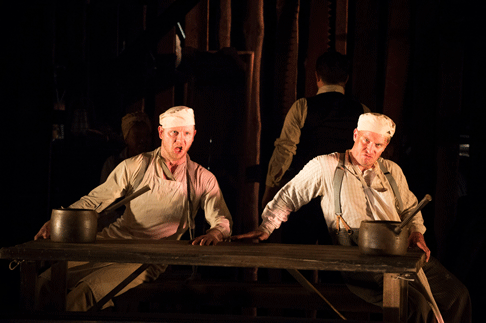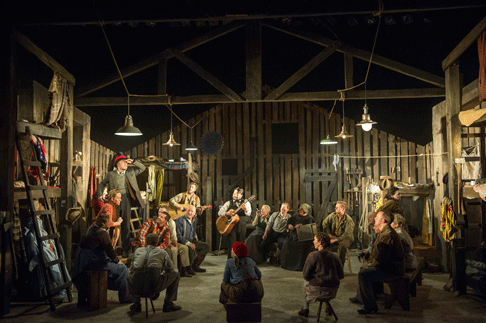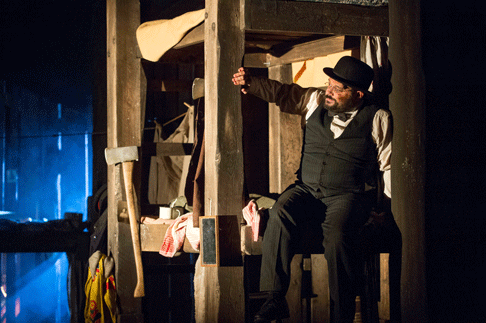![Ashley Catling (Hot Biscuit Slim) and Caryl Hughes (Tiny). [Photo by Richard Hubert Smith courtesy English Touring Opera]](http://www.operatoday.com/ETO_PaulBunyan_2649.gif)
22 Feb 2014
Benjamin Britten: Paul Bunyan
In a 1960 BBC interview, Britten explained to Lord Harewood: ‘I was very much influenced by [W.H.] Auden …
English Touring Opera are delighted to announce a season of lyric monodramas to tour nationally from October to December. The season features music for solo singer and piano by Argento, Britten, Tippett and Shostakovich with a bold and inventive approach to making opera during social distancing.
This tenth of ten Live from London concerts was in fact a recorded live performance from California. It was no less enjoyable for that, and it was also uplifting to learn that this wasn’t in fact the ‘last’ LfL event that we will be able to enjoy, courtesy of VOCES8 and their fellow vocal ensembles (more below …).
Ever since Wigmore Hall announced their superb series of autumn concerts, all streamed live and available free of charge, I’d been looking forward to this song recital by Ian Bostridge and Imogen Cooper.
Although Stile Antico’s programme article for their Live from London recital introduced their selection from the many treasures of the English Renaissance in the context of the theological debates and upheavals of the Tudor and Elizabethan years, their performance was more evocative of private chamber music than of public liturgy.
Evidently, face masks don’t stifle appreciative “Bravo!”s. And, reducing audience numbers doesn’t lower the volume of such acclamations. For, the audience at Wigmore Hall gave soprano Elizabeth Llewellyn and pianist Simon Lepper a greatly deserved warm reception and hearty response following this lunchtime recital of late-Romantic song.
For this week’s Live from London vocal recital we moved from the home of VOCES8, St Anne and St Agnes in the City of London, to Kings Place, where The Sixteen - who have been associate artists at the venue for some time - presented a programme of music and words bound together by the theme of ‘reflection’.
'Such is your divine Disposation that both you excellently understand, and royally entertaine the Exercise of Musicke.’
‘And there was war in heaven: Michael and his angels fought against the dragon; and the dragon fought and his angels, And prevailed not; neither was their place found any more in heaven … that old serpent … Satan, which deceiveth the whole world: he was cast out into the earth, and his angels were cast out with him.’
There was never any doubt that the fifth of the twelve Met Stars Live in Concert broadcasts was going to be a palpably intense and vivid event, as well as a musically stunning and theatrically enervating experience.
‘Love’ was the theme for this Live from London performance by Apollo5. Given the complexity and diversity of that human emotion, and Apollo5’s reputation for versatility and diverse repertoire, ranging from Renaissance choral music to jazz, from contemporary classical works to popular song, it was no surprise that their programme spanned 500 years and several musical styles.
The Academy of St Martin in the Fields have titled their autumn series of eight concerts - which are taking place at 5pm and 7.30pm on two Saturdays each month at their home venue in Trafalgar Square, and being filmed for streaming the following Thursday - ‘re:connect’.
The London Symphony Orchestra opened their Autumn 2020 season with a homage to Oliver Knussen, who died at the age of 66 in July 2018. The programme traced a national musical lineage through the twentieth century, from Britten to Knussen, on to Mark-Anthony Turnage, and entwining the LSO and Rattle too.
With the Live from London digital vocal festival entering the second half of the series, the festival’s host, VOCES8, returned to their home at St Annes and St Agnes in the City of London to present a sequence of ‘Choral Dances’ - vocal music inspired by dance, embracing diverse genres from the Renaissance madrigal to swing jazz.
Just a few unison string wriggles from the opening of Mozart’s overture to Le nozze di Figaro are enough to make any opera-lover perch on the edge of their seat, in excited anticipation of the drama in music to come, so there could be no other curtain-raiser for this Gala Concert at the Royal Opera House, the latest instalment from ‘their House’ to ‘our houses’.
"Before the ending of the day, creator of all things, we pray that, with your accustomed mercy, you may watch over us."
The doors at The Metropolitan Opera will not open to live audiences until 2021 at the earliest, and the likelihood of normal operatic life resuming in cities around the world looks but a distant dream at present. But, while we may not be invited from our homes into the opera house for some time yet, with its free daily screenings of past productions and its pay-per-view Met Stars Live in Concert series, the Met continues to bring opera into our homes.
Music-making at this year’s Grange Festival Opera may have fallen silent in June and July, but the country house and extensive grounds of The Grange provided an ideal setting for a weekend of twelve specially conceived ‘promenade’ performances encompassing music and dance.
There’s a “slide of harmony” and “all the bones leave your body at that moment and you collapse to the floor, it’s so extraordinary.”
“Music for a while, shall all your cares beguile.”
The hum of bees rising from myriad scented blooms; gentle strains of birdsong; the cheerful chatter of picnickers beside a still lake; decorous thwacks of leather on willow; song and music floating through the warm evening air.
![Ashley Catling (Hot Biscuit Slim) and Caryl Hughes (Tiny). [Photo by Richard Hubert Smith courtesy English Touring Opera]](http://www.operatoday.com/ETO_PaulBunyan_2649.gif)
In a 1960 BBC interview, Britten explained to Lord Harewood: ‘I was very much influenced by [W.H.] Auden …
He went to America, I think it was ‘38, early ‘39, and I went soon after. I think it wouldn’t be too much oversimplifying the situation to say that many of us young people at the time felt that Europe was more or less finished … I went to America and felt that I would make my future there.’ (Letters from a Life, vol.1, eds. Mitchell and Reed, p.619).
Premiered in May 1941 in the Brander Matthews Hall at Columbia University, Paul Bunyan — the ‘choral operetta’ that Britten and Auden created on the quintessentially American theme of the legend of the eponymous pioneering lumberjack — might be seen as a naïve attempt to beguile: an offering intended to confirm their artistic credentials for American citizenship. But it also hinted at the challenges ahead for a nation built upon a Dream, as its people learn that they must balance individual choice with the need to tolerate ‘difference’ and protect the ‘outsider’.
 Piotr Lempa (Ben Benny) and Stuart Haycock (Sam Sharkey)
Piotr Lempa (Ben Benny) and Stuart Haycock (Sam Sharkey)
It is a challenge to make something coherent of a work which offers both an uplifting parable and symbolic inferences; both light-hearted Broadway gags and more biting Thirties’ socialism. Britten’s score is an appealing medley of deft pastiches — blues quartet, country and western ballad, jazz lament, Gilbert and Sullivan comedy — each idiom following the next in quick succession, with the odd extravagant Donizettian-duet thrown into the mix; but the narrative thread is rather weak and the allegory at times ambiguous.
For this ETO production, director Liam Steel and set/costume designer Anna Fleischle opted to keep things fairly simple, housing all the action in an orthodox Loggers’ Cabin, and moving swiftly between the multifarious numbers in the manner of a slick Broadway musical. Even the Western Union Boy (tenor Matt R. J. Ward) was keen to get into the act, excitedly executing a polished table-top routine that would not have shamed Fred Astaire.
Singing the limpid, swinging motif that is one of the few uniting elements of the score, the unison chorus seemed a little slow to get going; but maybe this is the point — for the soporific way of life of the ‘Old Trees’ (represented by tall timbers of wood), before man’s arrival on earth, is overturned in this opening ensemble by the ambition and energy of the impatient ‘Young Trees’ (shorter burgeoning planks). In full voice by the end of the number, the ETO chorus was impressively resonant, foreshadowing an even more resplendent pinnacle, ‘O great day of discovery’, in Act 2.
Steel has decided to capitalise upon the fact that, while there is not much of a narrative thread, there are lots of terrific individual musical numbers in which Britten shows off his prowess as a master of pastiche and parody. The choreography was slick, particularly given the limits of the stage space; this is a genuine ‘company’ work, with the soloists coming forth from the chorus, and the ensemble numbers were the highpoint. Especially notable were the lumberjacks’ chorus in Act 1 in Act 1 — which utilised many a hackneyed Broadway gag to cheerful effect — the Quartet of Swedes, and the loggers’ hyperbolic, competitive rivalry for Tiny’s attention.
One of the challenges for a director is how to present the oversized eponymous hero who never actually appears on stage. Paul Bunyan is less a ‘character’ than an embodiment of man’s glorious spirit of conquest; but he is a static element in the drama and presents difficulties with regard to the integration of his projected, disembodied voice with the drama seen on stage. Steel had an ingenuous solution: as the tale of his birth and life was told by the collective gathering, Bunyan’s growth — from ‘six inches’, he gained ‘346 pounds every week’ and ‘grew so fast, by the time he was eight/ He was at tall as the Empire State’ — was illustrated by the ascending top hat of Uncle Sam which, bedecked with red and blue band, was lifted ever higher by successive members of the company, a metaphor for Bunyan and a personification of the emergent nation. Subsequently, the awe-struck loggers addressed their champion with gazes striving upwards, a rickety ladder adorned with a bedraggled Star-Spangled Banner pointing to a distant pinnacle of aspiration. Bunyan’s words were intoned sonorously but without sententiousness by Damian Lewis.
 Company members
Company members
Tenor Mark Wilde skilfully conveyed the reflective introspection of Johnny Inkslinger, the brooding ‘book keeper’, using a tender voice and expressive nuance most sensitively. In his big Act 1 number, ‘Inkslinger’s Song’, in which the troubled outsider reflects on the irreconcilable gap between the simplicity of nature and the complexity of human culture, Wilde’s tone and projection grew in a controlled fashion as the melody expanded from recitative-like declamation to arioso outpouring. Although he was at times a little pushed at the top, Wilde created a convincingly rounded character, a man capable of complexity of feeling. Seated on a bunk, alone in the cabin, in Inkslinger’s ‘Regret’, his despair in the face of the conflict between hope and misfortune was poignant in its simplicity of articulation.
Elsewhere there was indulgent exuberance. Crooning an Italianate ‘Cooks’ duet’, bass Piotr Lempa (Ben Benny) and tenor Stuart Haycock (Sam Sharkey) were deliciously camp. They made sure that we were aware that Auden’s slick satire on vulgarity of an advertising culture which plays upon our insecurities — ‘The Best People are crazy about soups! … Beans are all the rage among the Higher Income Groups!’ — is just as apt now as in the 1930s.
The animal roles, cast for female voices, provide a welcome complement to the rugged male voices that predominate, and Abigail Kelly, as the dog Fido, and Amy J. Payne and Emma Watkinson, as the felines Moppet and Poppet, were both alluring of voice and edgy of character: when feisty Fido joined the courtesan cats in a piquant denouncement of social ills in the Act 2 ‘Litany’, their appeal ‘Save animals and men’, made an impact. As the loafer-flapping Geese, a form of life half-way between the trees and mankind, Lorna Bridge, Annabel Mountford and Hannah Sawle also sang with vocal precision and dramatic impact.
Many of these characters in this nascent nature are not only searching for their future paths but also for their inner selves. Tenor Ashley Catling revealed a thoughtfulness hidden by the logger’s brawn in Slim’s Song, as he lamented, ‘I must hunt my shadow/ And the self I lack’. Baritone Wyn Pencarreg was splendid as the bewildered foreman Hel Helson, a dull dunderhead who is bewildered by life’s turns and tribulations. Pencarreg blindly blustered in ‘The Mocking of Hel Helson’, brutally asserting ‘versions’ of his self — ‘Helson the Brave, the Fair, the Wise …’ — but also winning our sympathy.
Helsons’s violent, futile assault on Bunyan is juxtaposed with the love duet of Slim and Tiny, the latter role sung with sweet clarity and warmth by mezzo soprano Caryl Hughes. Steel placed the frolicking lovers and the felled logger on top and lower bunk respectively, surrounded by a chorus by turns mournful then scornful — a delightful comic juxtaposition.
One detail which failed to convince was the sharing of the Narrator’s ballads between Inkslinger and the company. It’s true that by allowing the members of the collective to take successive lines of the guitar-accompanied ballads, Steel allowed them to tell their own tale; but, the balladeer can lend a useful ironic distance and serve as narrative link between the essentially stand-alone numbers. And, Inkslinger himself is at one remove from the collective, a man of words and thoughts, reflecting on his actions and motives, achievements and future paths, much like Auden himself at this time; he is decidedly not one of the herd.
In the rather dry acoustic of the Linbury Studio Theatre, Britten’s economical woodwind-based orchestration provided a fitting commentary on the vocal numbers; this was especially so in Inskslinger’s numbers. The ETO orchestra was placed behind the back wall of the cabin, but the woodwind pierced through crisp and clear, although some of the string resonance was sacrificed. Conductor Philip Sunderland kept things moving along with many a well-judged tempo: the jazz-inspired ‘Quartet of the Defeated’ was aptly funereal.
There are dark undertones in this operetta, though: ‘Inkslinger’s Song’ concludes with an outpouring of the social conscience of the 1930s: ‘Oh, but where are the beautiful places/ Where what you begin you complete,/ Where the joy shine out of men’ faces,/ And all get sufficient to eat?’. For all its virtues, Steel’s rather homespun reading didn’t always capture this aspect. Indeed, Paul Bunyan’s ‘Goodnight’ which closes Act 1 (a passage which was added by Britten during revisions to the score in 1974) put me in mind of the 1970s television show The Waltons — as darkness fell and the lapping dog quietened, I half expected to hear ‘G’night John-Boy’ echoing from the loggers’ bunks!
 Mark Wilde (Johnny Inkslinger)
Mark Wilde (Johnny Inkslinger)
One of the side-effects of the almost relentlessly up-beat feeling was that moments of stillness and import did not always make their full impact. One of the most powerful musico-dramatic moments comes in the opening scene when ‘the whole pattern of life is altered’ and ‘the moon turns blue’: the logger who enthusiastically slapped blue paint on the cog-wheel perched high up the cabin wall raised a wry titter, but I’m not sure that this really captured the romance of Britten’s ethereal ‘gamelan’ colours and harmonies.
Similarly, at the end, Bunyan’s final words to the emergent nation were somewhat lost, as the party-goers began clearing up the debris of the celebration. Perhaps Steel was making a subtle point: Bunyan says, ‘America is what you do/ America is I and you, /America is what you choose to make it’, but these Americans did not listen and failed to recognise their responsibilities, individual and collective. In the closing moments, Steel attempted to add some political depth to the production. If the action had already suggested that the American Dream was flawed at the start, then the future certainly did not look good for these loggers, judging by the contents of the wicker basket left by Bunyan for the loggers, like a prophesy to be resignedly accepted or actively resisted. Bent intently, and to the incredulity of the onlookers, Inkslinger withdrew first a pistol, then a lurid Guantanamo jumpsuit, followed by an overly large Bible (presaging the influence of the Christian Right?), a shabby copy of Playboy, some fast food wrappers, a lap-top, a periwig and noose. This chain of emblems of the institutions of state and finance spoke powerfully. The final image of black soprano Abigail Kelly, draped with a crumpled Stars and Stripes, was a poignant one.
Claire Seymour
English Touring Opera’s productions of King Priam, Paul Bunyan and The Magic Flute continue at the Linbury Studio Theatre until 22nd February and then tour until 31st May. See www.englishtouringopera.org.uk for further details.
Cast and production information:
Paul Bunyan, Damian Lewis; Jonny Inkslinger, Mark Wilde; Hel Helson, Wyn Pencarreg; Tiny, Caryl Hughes; Hot Biscuit Slim, Ashley Catling; Sam Sharkey/Andy Anderson, Stuart Haycock; Ben Benny, Piotr Lempa; Fido, Abigail Kelly; Moppet, Amy J Payne; Poppet/Moon, Emma Watkinson; Western Union Boy, Matt R J Ward; John Shears/Blues Singer, Adam Tunnicliffe; Cross Crosshaulson/Farmer Matthew Sprange; Blues Singer/Crony, Johnny Herford; Blues Singer/Crony, Henry Manning; Jen Jenson/Crony, Maciek O’Shea; Pete Peterson, Simon Gfeller; Goose/Wind, Hannah Sawle; Goose, Lorna Bridge; Goose/Heron, Annabel Mountford; Blues Singer/Squirrel, Helen Johnson; Beetle, Susan Moore; Young Tree/Boy, Emily-Jane Thomas; Conductor, Philip Sunderland; Director, Liam Steel; Designer, Anna Fleischle; Lighting Designer, Guy Hoare; Assistant Director, Dafydd Hall Williams. Linbury Studio Theatre, Royal Opera House, Covent Garden, London, Wednesday 19th February 2014.